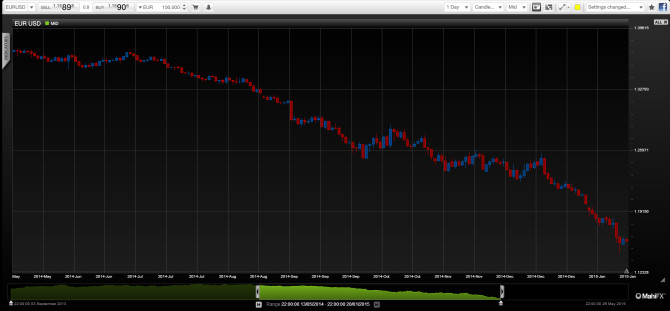This Thursday’s ECB press conference will be a show stopper for the forex markets and could deliver another market moving shocker following closely on the Swiss National Bank’s surprise decision to unpeg CHF from the EUR last week.
The ECB is widely expected to announce the launch of a long waited and much anticipated quantitative easing programme on Thursday. Markets are already speculating about its size – EUR 0.5-1.0 trillion – and it’s composition, buying only high credit quality sovereign bonds or buying sovereign bonds of all Eurozone countries with national central banks responsible for any losses due to defaults.
However, there is a chance there may be no QE announcement. Germany is strongly opposed to it and may get its way. If that happens the EUR is likely to spike as traders rush to cover short positions and reassess the ECB’s ability to manage monetary policy.
Such an outcome would be a severe blow to the ECB’s independence. It’s one thing for politicians to air their views publicly, but it’s quite another for them to actually get their way.
By Justin Pugsley, Markets Analyst MahiFX
Follow @MahiFX on twitter
EUR/USD – could Thursday be a trend changer?

What’s at stake
Of course the ECB will attribute any delay to other factors. It could cite the upcoming Greek election on January 25 where an anti-austerity party could gain a majority. It could point to the big fall in oil prices stating that this could revive Eurozone growth in H2 and eventually inflation. And it could talk about giving all the other ECB stimulus programmes more time to work.
Indeed, German critics of QE have named all these factors as good reasons not to do QE.
If QE is seen as being delayed a few months longer it won’t alter perceptions that much for the EUR. However, if it is seen as being off the table for good, then the EUR could soar. Deflation actually makes the currency more valuable plus the Eurozone sports a substantial current account surplus. The only fly in that ointment is political uncertainty. If Greece were for instance to leave the Eurozone the markets would quickly round on the next country to leave – in this case probably Portugal or Italy.
Much hangs in the balance this Thursday for the EUR. If all goes as expected the single currency’s long-term trajectory is likely to continue downwards.
